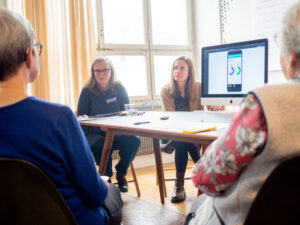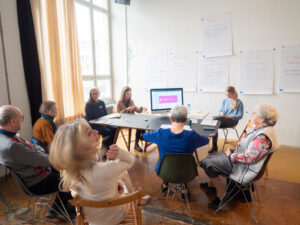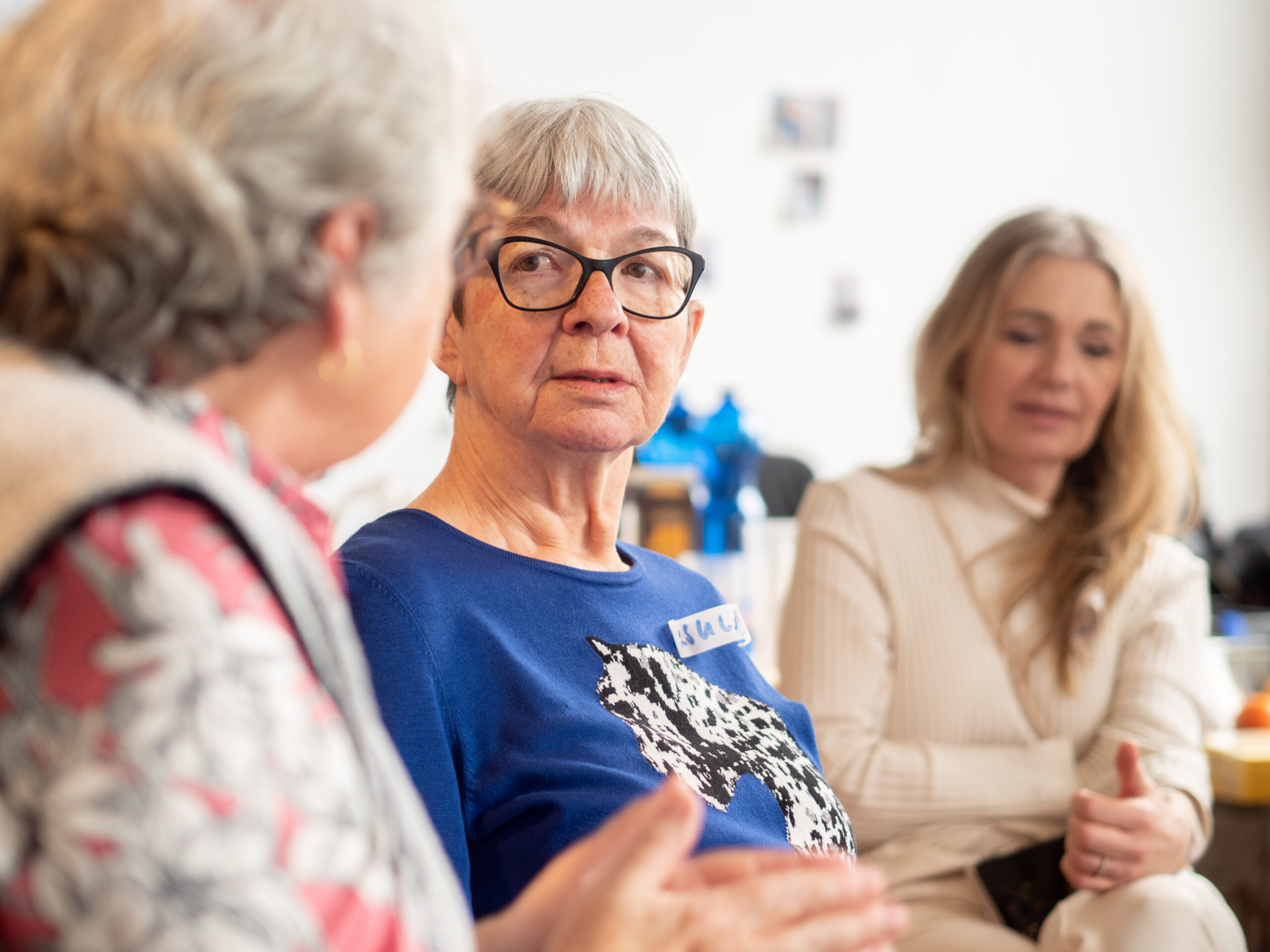Becoming a Caregiver in Your Golden Years? Tools and Tips for Active Seniors
Aging is often seen as a time for relaxation and reflection, but for some active seniors, it's also a chance to give back and make a meaningful difference in the lives of others. Becoming a caregiver for seniors while being an active senior yourself is a unique journey filled with both challenges and rewards. In this blog post, we'll explore how active seniors can become caregivers and the invaluable tools, including ICT solutions for caregivers, that can assist in this fulfilling role.

- Understanding the Role of a Caregiver:
Before embarking on this path, it's crucial for active seniors to understand the responsibilities of a caregiver. This includes providing physical assistance, emotional support, and companionship to those in need. Recognize that caregiving is both an art and a science, requiring patience, empathy, and flexibility.
- Leverage Your Life Experience:
Active seniors come to the caregiving role with a wealth of life experience. Use your wisdom and compassion to connect with those you care for on a deeper level. Your understanding of the aging process and the unique challenges it presents can be a tremendous asset.
- Stay Physically Fit:
Being an active senior caregiver demands physical stamina. Engage in seniors' activities that keep you fit and energized. Regular exercise, a balanced diet, and adequate rest are essential for maintaining the strength and vitality needed for caregiving.
- Utilize ICT Solutions for Caregivers:
Information and Communication Technology (ICT) solutions offer valuable tools for caregivers. Here are some ways ICT can assist:
- Telehealth Services: Use telehealth apps and services to facilitate remote medical consultations, ensuring that the seniors you care for receive timely healthcare support.
- Medication Management Apps: Medication reminders and tracking apps can help you manage medications for seniors efficiently and reduce the risk of missed doses.
- Communication Apps: Stay connected with loved ones, fellow caregivers, and support groups through video conferencing apps. These platforms provide an outlet for sharing experiences and seeking advice.
- Health Monitoring Devices: Wearable devices and health apps can help you monitor seniors' vital signs and activity levels, allowing you to address any health concerns promptly.
- Easierphone App: Consider using the EasierPhone app, a user-friendly smartphone application specifically designed for seniors. It simplifies the smartphone experience, making it easier for seniors to stay connected, access important information, and communicate with their caregivers. This intuitive app is an invaluable tool for active senior caregivers, ensuring that you and the seniors you care for can use digital technology with confidence and ease.
- Seek Training and Support:
Even as an active senior caregiver, there's always more to learn. Seek training and resources on caregiving techniques, communication skills, and strategies for managing stress. Many organizations and online platforms offer free courses and support groups.
- Maintain a Support System:
Caregiving can be emotionally taxing at times. Ensure you have a support system in place. Reach out to friends, family, and support groups to share your experiences and seek assistance when needed.
- Set Realistic Boundaries:
As a caregiver for seniors, it's essential to set realistic boundaries to avoid burnout. Know your limitations and communicate them clearly with the seniors you care for and their families.
Becoming a caregiver in your golden years as an active senior is a noble and rewarding journey. Your life experience, empathy, and the use of ICT solutions for caregivers can be powerful tools in providing compassionate care. Remember to prioritize your own well-being, seek support and training, and establish healthy boundaries to ensure a fulfilling and sustainable caregiving experience. By embracing this role, you not only make a difference in the lives of others but also find a profound sense of purpose and fulfillment in your golden years.
Audiobooks: A Perfect Fit for Seniors and Their Digital Skills
As technology continues to advance, seniors are increasingly embracing digital tools and devices to enrich their lives. One such digital marvel that aligns perfectly with seniors' digital skills and penchant for convenience is the audiobook. In this blog post, we'll explore why audiobooks are a superb solution for seniors and how they can enhance the reading experience while accommodating seniors' familiarity with smartphones.

- Accessibility and Convenience:
For seniors who may experience vision problems or find traditional print books cumbersome, audiobooks provide a convenient alternative. With a simple tap on their smartphone, they can access a vast library of books and enjoy literary adventures without straining their eyes or carrying heavy tomes.
- Enhanced Mobility:
Seniors' mobility can sometimes be restricted, making trips to the library or bookstore challenging. Audiobooks eliminate this hurdle by allowing them to carry an entire library in the palm of their hand. Seniors can take their favorite books with them wherever they go, whether it's a walk in the park or a long car journey.
- Multitasking Made Easy:
Audiobooks are the ultimate multitasking companion. Seniors can enjoy their favorite books while performing other activities, such as cooking, gardening, or exercising. This feature enables them to make the most of their time and stay engaged with literature throughout the day.
- Improved Focus and Comprehension:
Many seniors find that audiobooks enhance their focus and comprehension compared to traditional reading. The narration provides a clear and engaging storytelling experience, making it easier for seniors to follow the plot and immerse themselves in the book's world.
- Enriched Language and Vocabulary:
Audiobooks offer seniors the opportunity to listen to well-articulated language, enriching their vocabulary and language skills. It's an enjoyable way to keep cognitive functions sharp and expand one's linguistic horizons.
- Variety of Genres and Authors:
Audiobook libraries boast an extensive collection of genres and authors. Seniors can explore classic literature, modern fiction, biographies, and much more, allowing them to discover new interests and revisit old favorites.
- Social Experience:
Audiobooks can be enjoyed in a social setting as well. Seniors can share their favorite stories with friends and family, fostering discussions and strengthening social bonds. It's an excellent way to connect with loved ones over shared literary interests.
- User-Friendly Smartphone Integration:
Audiobook apps are designed to be user-friendly, making them accessible to seniors who are familiar with smartphone technology. Seniors can easily navigate through libraries, pause, rewind, or adjust the playback speed to suit their preferences.
Audiobooks are a wonderful solution for seniors seeking to combine their digital skills with their love for literature. With the accessibility and convenience of smartphones, seniors can embark on literary journeys, explore new worlds, and enhance their cognitive abilities. Audiobooks provide an engaging and immersive reading experience that aligns perfectly with the evolving digital landscape, ensuring that seniors can continue to enjoy the magic of storytelling regardless of their age or physical limitations. So, whether it's the classics, mysteries, or memoirs, seniors can now carry an entire library in their pocket and experience the joy of reading in a whole new way.
Bouncing Back: How to Return to Full Activity After a Prolonged Break Due to Injury or Sickness
Life has a way of throwing curveballs, and sometimes those curveballs come in the form of injuries or illnesses that force us to take a step back from our usual activities. Whether you've been sidelined by a sports injury, a medical condition, or a lengthy illness, the path to returning to full activity can be challenging but ultimately rewarding. In this article, we'll explore how to make a successful comeback and regain your physical and mental well-being.

- Seek Professional Guidance
Before embarking on your journey to recovery, it's crucial to consult with a healthcare professional. Whether it's a physician, physical therapist, or specialist, they can provide valuable insights into your specific condition and create a tailored plan for your comeback. Their guidance is instrumental in ensuring that you progress safely and minimize the risk of setbacks.
- Set Realistic Goals
While it's natural to want to jump back into your previous activities at full throttle, setting realistic goals is key to a successful comeback. Start small and gradually increase the intensity and duration of your activities as your body adapts. Celebrate each milestone, no matter how minor it may seem, as it represents progress toward your ultimate goal.
- Focus on Rehabilitation
Rehabilitation exercises and therapies are often essential components of recovery. These activities are designed to improve your strength, flexibility, and overall function. Be consistent with your rehabilitation program, even when you start feeling better, to ensure a solid foundation for a full return to activity.
- Listen to Your Body
Your body is your best guide during the recovery process. Pay close attention to any pain, discomfort, or signs of fatigue. Pushing through pain can lead to setbacks and reinjury. If something doesn't feel right, consult with your healthcare provider and adjust your plan accordingly.
- Nutrition and Hydration
Proper nutrition plays a vital role in the recovery process. Ensure that you're fueling your body with a balanced diet rich in essential nutrients. Adequate hydration is equally important for overall health and optimal recovery. Consult a nutritionist if necessary to tailor your diet to your specific needs.
- Rest and Sleep
Rest is as crucial as physical activity during recovery. Allow your body ample time to rest and heal between workouts or therapy sessions. Quality sleep is when the body undergoes significant repair and regeneration, so prioritize getting enough restorative sleep each night.
- Manage Stress and Mental Health
Recovery can take a toll on your mental health as well. It's common to experience frustration or anxiety during the process. Consider incorporating relaxation techniques such as meditation or deep breathing exercises to manage stress. Don't hesitate to seek support from a mental health professional if needed.
- Stay Positive and Patient
Recovery is a journey, not a destination. Stay positive and patient throughout the process. There will be ups and downs, but maintaining a hopeful outlook can make a significant difference in your progress.
- Gradual Return to Activity
As you regain your strength and confidence, gradually reintroduce yourself to your chosen activities. Whether it's running, cycling, or playing a sport, start with shorter sessions at reduced intensity and slowly work your way up.
- Embrace Adaptation
Your comeback may require adjustments. You might need to modify your technique, use supportive gear, or explore new activities that are gentler on your body. Be open to adaptation and flexibility in your approach.
Conclusion
Coming back to full activity after a prolonged break due to injury or sickness is a journey that demands patience, determination, and a commitment to your well-being. Seek professional guidance, set realistic goals, and prioritize your physical and mental health. Remember that setbacks are a part of the process, and each step forward, no matter how small, is a triumph on the road to recovery. Your comeback story is a testament to your resilience and determination to reclaim a healthy, active life.
Insightful feedback on elderly smartphone users’ needs and concerns during co-creation workshop in Zurich
3rd co-creation session was organized in the facility of IAF in Zurich. A bunch of new impressions and comments were delivered during the workshop which aimed to list improvements to be made in the Easierphone app. It also brought a new perspective on adult users’ needs regarding the use of smartphones.
IAF team gathered a group of seniors to test all Easierphone modules and ask in-depth questions about general impressions, concerns, and specific situations when the modules could be useful as well as answer many questions, especially regarding privacy policy and safety factors.

Attendees were curious about how the movement tracking module is working and what kind of information will be available for the caregiver. What is important, Easierphone occurred to be useful for people suffering from dementia. A tracking module with remote assistance can help follow a wandering person when one is lost. It can be also supported by the “Emergency” button to immediately inform the dedicated person when a dangerous situation happens and immediate help from the assistive person is needed.
Participants of the session also raised up an issue on personal data access by the person who will remotely support the elderly user. It is important to mention that the consent form will be clearly formulated to avoid the situation when the user doesn’t know to which data the assistant will have access.

Overall, the Easierphone apps were assessed positively as a needed tool for an elderly person. Security of personal data and safety in daily usage were the most important issues for IAF’s early users. The Easierphone team will put attention, especially to these aspects of the solution before it will be introduced to the market.
Want to test the app and become an early adopter? Contact us:
